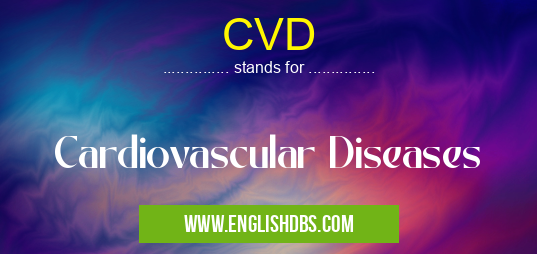What does CVD mean in HOSPITALS
Cardiovascular Disease (CVD) is a term used to refer collectively to a variety of diseases that affect the heart and the blood vessels. These conditions often result in cardiac arrest, heart attack, stroke, or other serious health issues. This article will provide an explanation about CVD and answer some frequently asked questions.

CVD meaning in Hospitals in Medical
CVD mostly used in an acronym Hospitals in Category Medical that means Cardiovascular Diseases
Shorthand: CVD,
Full Form: Cardiovascular Diseases
For more information of "Cardiovascular Diseases", see the section below.
Essential Questions and Answers on Cardiovascular Diseases in "MEDICAL»HOSP"
What is CVD?
CVD stands for Cardiovascular Disease, which includes any type of disease or condition that affects the heart and/or the blood vessels. The most common forms of CVD are coronary artery disease, arrhythmias, hypertension, congestive heart failure, and peripheral vascular disease.
What are the main causes of CVD?
The main causes of CVD include high cholesterol levels, smoking, high blood pressure, diabetes mellitus, obesity, physical inactivity, and an unhealthy diet. Alcohol abuse and certain genetic factors can also play a role in developing CVD.
What are the signs and symptoms of CVD?
Signs and symptoms of CVD can vary depending on the type of condition being experienced. Some common warning signs include chest pain or discomfort such as tightness or pressure; shortness of breath; nausea; lightheadedness; or pain that radiates down the arms or neck.
Who is at risk for developing CVD?
People who have family members with cardiovascular diseases may be more likely to develop them themselves. Additionally, those who smoke cigarettes regularly; have high cholesterol levels; suffer from uncontrolled diabetes mellitus; are obese; lead sedentary lives; eat an unhealthy diet; drink large amounts of alcohol on a regular basis - all increase their risk for developing cardiovascular problems.
How can I prevent myself from getting CVD?
A healthy lifestyle is key to reducing your risk for chronic cardiovascular diseases. Eating a balanced diet with plenty of fruits and vegetables helps maintain healthy cholesterol levels and keep weight under control. Regular exercise strengthens your heart muscles and reduces stress levels while abstaining from smoking helps reduce inflammation in your body's arteries and veins — all actions which can help reduce your chances for developing cardiovascular illnesses.
Final Words:
Cardiovascular Diseases (CVD) refers to any type of disease or disorder affecting the heart and/or its surrounding blood vessels -- including coronary artery disease, heart failure, stroke etc.. Risk factors associated with these conditions include age & gender factors as well as lifestyle choices like smoking & not exercising enough etc.. Knowing what steps to take in order to reduce one's chances for developing these types of illnesses is important for promoting long-term health & wellness.
